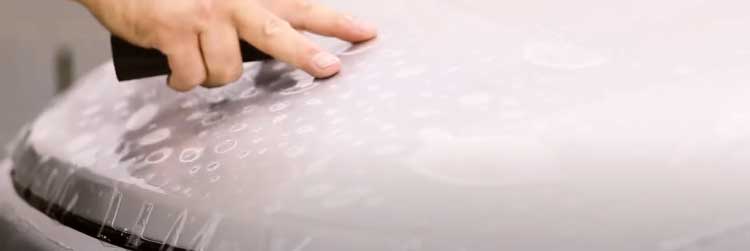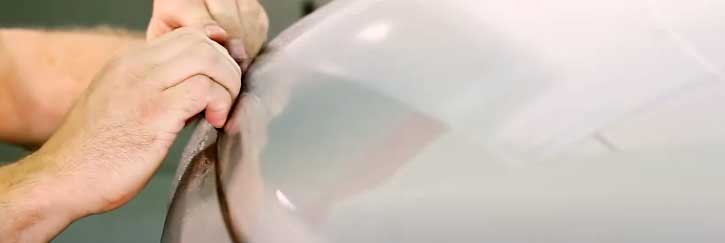Every car owner dreads the inevitable chipping, scratching, and color fading that can happen to the vehicle’s paint job over time. Enter Toyota’s paint protection film (PPF), a product that promises to keep your car looking showroom fresh for longer.
But is it worth it?
This detailed review seeks to answer that question by looking at the pros and cons of Toyota’s paint protection film.
The Basics of Toyota’s Paint Protection Film

The Toyota paint protection film is a thermoplastic urethane film applied to the painted surfaces of a vehicle to protect the paint from stone chips, bug splatters, minor abrasions, and the sun’s harmful UV rays.
The PPF’s primary aim is to keep your vehicle looking as good as new, which is undoubtedly an appealing prospect.
The Pros: Why You Should Consider the Toyota Paint Protection Film
- Extensive Protection
One of the greatest benefits of Toyota’s paint protection film is the superior protection it provides against a host of potential damages. Whether it’s flying gravel on the highway, pesky door dings, or harmful UV rays, this film keeps your car’s paint job safe.
- Increased Resale Value
A vehicle in great condition will undoubtedly fetch a higher price when it’s time to sell. By preserving the quality of your car’s paintwork, Toyota’s PPF could increase your vehicle’s resale value.
- Durability
The question on every car owner’s lips is, “How long does Toyota paint protection film last?” Generally, a high-quality PPF like Toyota’s can last between 5 to 10 years, depending on maintenance and weather conditions. The longevity of the film certainly adds to its appeal.
- Aesthetic Appeal
A car with a fresh, unblemished paint job is always a sight to behold. Toyota’s PPF provides a glossy finish that enhances your vehicle’s aesthetic appeal while ensuring the paint remains untouched beneath.
Also Read: Audi Pure Protection Reviews.
The Cons: Potential Downsides to Consider

While Toyota paint protection film reviews are generally positive, it’s essential to discuss potential downsides.
- Cost
While it’s not the most expensive product on the market, Toyota’s PPF isn’t exactly cheap either. Depending on your vehicle’s size and the film’s coverage, the cost can range widely. The question “Is paint protection film on a car worth it?” becomes more complicated when considering the initial financial outlay.
- Installation Complexity
A major disadvantage of paint protection film is that it’s not a DIY product. Installation requires professional skills, and improper installation can lead to visible seams, bubbles, or peeling edges.
- Maintenance
While the film is durable, it requires proper maintenance to maximize its lifespan. This means regular washing and waxing, which could be an inconvenience for some car owners.
Comparing Toyota Paint Protection Film With Its Competitors
Now that we have a clear understanding of Toyota’s Paint Protection Film, let’s examine how it fares against five of its main competitors: 3M Scotchgard, XPEL Ultimate, LLumar Platinum, SunTek PPF, and Avery Dennison SPF-XI.
- 3M Scotchgard Pro Series
3M Scotchgard Pro Series is well-respected in the automotive industry and one of Toyota PPF’s key competitors. It offers a high level of protection and impressive clarity, ensuring that your vehicle’s beauty shines through.
It is also self-healing, which means minor scratches can disappear with the application of heat. However, Scotchgard Pro Series falls short in terms of durability compared to Toyota PPF, lasting around 5-7 years on average. Additionally, it is a bit more expensive than the Toyota PPF.
- XPEL Ultimate Plus
XPEL Ultimate Plus provides excellent protection and boasts a self-healing feature, which uses heat to mend minor scratches and swirls. Its high-gloss finish enhances your car’s look, similar to Toyota’s PPF. The XPEL Ultimate Plus lasts around 10 years, similar to the Toyota PPF.
However, it’s one of the most expensive options on the market, making Toyota’s PPF a more affordable choice for many car owners.
- LLumar Platinum
LLumar Platinum is another high-quality PPF that offers robust protection. It features advanced self-healing properties and a hydrophobic surface for easy cleaning.
However, it lacks in terms of clarity when compared to Toyota’s PPF, meaning the film can alter the vehicle’s color slightly. In terms of cost and durability, LLumar Platinum is fairly similar to the Toyota PPF.
- SunTek PPF
SunTek PPF offers excellent protection, a high-gloss finish, and hydrophobic properties. It also has a self-healing feature to mend minor scratches and swirls.
However, SunTek PPF falls short in its durability, with an average lifespan of around 5 years. This makes Toyota’s PPF a more durable choice.
- Avery Dennison SPF-XI
Avery Dennison SPF-XI is a strong competitor with excellent clarity, protection, and self-healing properties. Its standout feature is its environmental resistance, meaning it can withstand harsh weather conditions better than many other films.
However, it is more expensive than the Toyota PPF and lasts around the same length of time.
While each of these PPFs has its unique strengths, Toyota’s Paint Protection Film holds its own. It provides an excellent balance between cost, durability, and protection.
The decision on which film to choose ultimately depends on your priorities, be it durability, cost-effectiveness, or self-healing properties. Nonetheless, Toyota PPF’s positive reviews and proven track record make it a worthy contender in the competitive world of paint protection films.
Also Read: Is Gtechniq Is Better Than CQuartz Coating?
Frequently Asked Questions (FAQ)
Toyota uses a high-quality, clear thermoplastic urethane film. It is designed to resist impact and abrasion, providing excellent protection for your vehicle.
On average, Toyota paint protection film can last between 5 to 10 years, depending on the conditions of use and maintenance.
The answer to this question is largely subjective. It depends on the owner’s priorities. If you prioritize preserving your car’s paint job and maintaining a high resale value, then it could be worth the investment.
The major disadvantages include the initial cost, the need for professional installation, and the requirement for regular maintenance.
Final Thoughts
There is no denying that Toyota’s paint protection film provides an added layer of security for your car’s exterior. The pros seem to outweigh the cons, especially if maintaining your car’s aesthetic appeal and value are your priorities.
The question, “Is Toyota paint protection film worth it?” is ultimately dependent on the individual car owner’s needs and preferences. By balancing the benefits against the potential drawbacks, you can make an informed decision that suits your specific circumstances.


Good intro, but what happens in 7-10 years when the protection expires? Does it peel, discolor, other? What is proper maintenance & what do you do when it fails? Just curious for more depth…